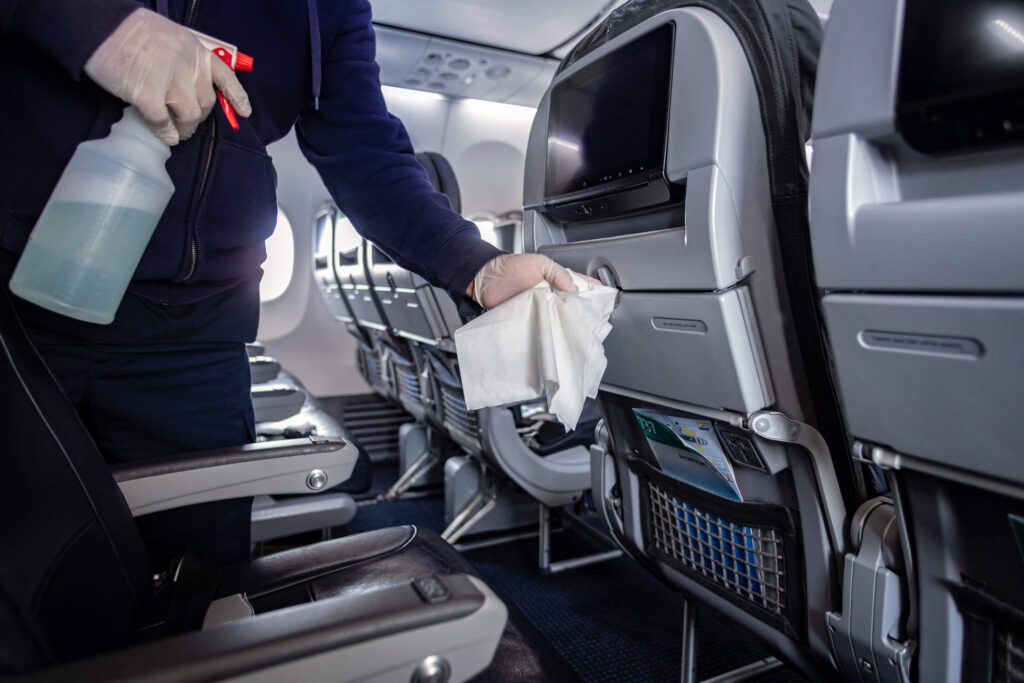Flight Attendants Raise Concerns Over New COVID-19 Quarantine Requirements

An American Airlines crewmember cleans a seatback as part of the carrier's comprehensive cleaning program. Photo courtesy: American Airlines
After the U.S. Centers for Disease Control reduced the recommended post-exposure quarantine period to five days, the Association of Flight Attendants-CWA is pushing back, saying the new guidelines were based on corporate recommendations – not medical recommendations.
Quarantine Period Reduced to Five Days, But Flight Attendants Say It Will Create Unsafe Environments
The new quarantine suggestions were issued on Monday, December 27, 2021. Under the guidance, those who are unvaccinated or have not yet received a booster shot should quarantine for five days after getting exposed to someone with COVID-19. Afterwards, they may return to normal activities but maintain social distance and strict face covering usage if they show no symptoms of infection. If a five-day quarantine isn’t possible, the person is suggested to wear a face mask around everyone for at least 10 days.
“CDC’s updated recommendations for isolation and quarantine balance what we know about the spread of the virus and the protection provided by vaccination and booster doses,” agency director Dr. Rochelle Walensky said in a statement. “These updates ensure people can safely continue their daily lives.”
However, the AFA-CWA is suspicious of the timing of the new recommendations. The update was issued after Delta Air Lines sent a letter to the CDC requesting the change, citing data from their chief medical officer and consultants. The union says by changing the quarantine period, the CDC is bending to corporate interests instead of what’s best for the public. In a statement sent to FlyerTalk, union president Sara Nelson claims forcing employees to come back “before they feel better” could create an “unsafe working environment” for both flyers and flight attendants, which she says “…will cause a much greater disruption than any ‘staff shortages.’”
“We cannot allow pandemic fatigue to lead to decisions that extend the life of the pandemic or put policies on the backs of workers,” Nelson said in the statement. “Already the lack of paid sick leave creates pressure on workers to come to work sick. Corporations that fail to recognize this with paid sick leave, or pressure workers to come to work sick or face discipline, are failing their workers and their customers.”
Omicron Forces Airlines to Balance Health and Operational Needs
Even though the recommended quarantine period for those exposed to COVID-19 is reduced, airlines are still experiencing issues keeping flights operating on schedule. A nationwide outbreak of the virus forced airlines to cancel flights over the Christmas holiday weekend, while Airlines for America has partially blamed the “Great Resignation” for a lack of airline staff.























mss formation
The "a" was not allowed -- very narrow range of permitted speech here.
After I saw 'Union President claims...' I stopped reading.
Did you enjoy your Christmas holiday days off? - If so thank a Union.
thats patently a false statement. Many companies give employees Christmas and other holidays off and are not unionized.
The amount of respect the CDC has lost in the last two years is really incredible....this is an absolutely deplorable decision. Only in America.....
You're right about the CDC losing credibility, but that happened well before this decision.
the same can be said about unions losing credibility. Goes both ways.
Based on the extensive reading I've done on the transmission of the virus versions, it appears union leadership is very ill informed. Latest view is 2 days before symptoms and 3 days after, and those infected but without symptoms do not transmit the virus.
lol......no.
Rarely does the head of a union have the best interests of the customer, or even the employees, in mind when making decisions. How does a flight attendant know better than the CDC and management about medical matters?
1000% correct.
if airlines caved into every demmand by a union, airlines would be bankrput and out of business.
Ah yeah, Management, always the ones with the best interest of employees and customers in mind. You can't be serious.
Kinda like the teachers unions. Both work in very low risk situations but demand the risk be reduced to near zero before they'll return to work.